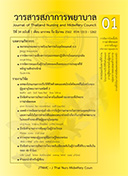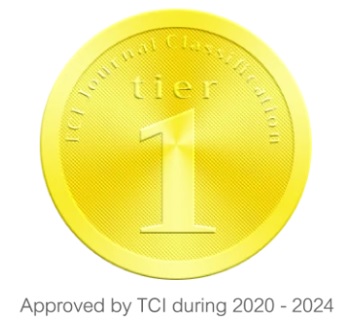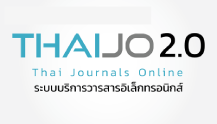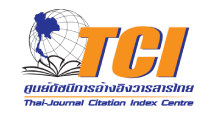ผลของโปรแกรมการปรับวิถีชีวิตด้วยตนเองต่อไกลโคไซเลทฮีโมโกลบินของผู้สูงอายุโรคเบาหวานชนิดที่ 2
คำสำคัญ:
โปรแกรมการปรับวิถีชีวิตด้วยตนเอง, ไกลโคไซเลทฮีโมโกลบิน, ผู้สูงอายุโรคเบาหวานชนิดที่ 2บทคัดย่อ
วัตถุประสงค์ของการวิจัย: เพื่อศึกษาผลของโปรแกรมการปรับวิถีชีวิตด้วยตนเองต่อไกลโคไซเลท ฮีโมโกลบินของผู้สูงอายุโรคเบาหวานชนิดที่ 2
การออกแบบวิจัย: การวิจัยกึ่งทดลองแบบ 2 กลุ่มวัดก่อนและหลัง
การดำเนินการวิจัย: คัดเลือกกลุ่มตัวอย่างแบบเฉพาะเจาะจงตามคุณสมบัติที่กำหนด จำนวน 44 คนจากผู้สูงอายุที่เป็นโรคเบาหวานชนิดที่ 2 ที่มารับการรักษาที่คลินิกเบาหวานในโรงพยาบาลส่งเสริมสุขภาพ 2 แห่ง ในจังหวัดเชียงใหม่ ระหว่างเดือนตุลาคม พ.ศ. 2560 ถึงเดือนมีนาคม พ.ศ.2561โดยการจับคู่ให้กลุ่มมีความคล้ายคลึงกันในด้านอายุ เพศ ระยะเวลาการป่วยเป็นโรคเบาหวาน ยารักษาเบาหวานชนิดรับประทาน และโรคร่วม กลุ่มทดลองได้รับการโปรแกรมการปรับวิถีชีวิตด้วยตนเองเป็นระยะเวลา 12 สัปดาห์ กลุ่มควบคุมได้รับการดูแลตามปกติ เครื่องมือที่ใช้ในการเก็บรวบรวมข้อมูลประกอบด้วย แบบสอบถามข้อมูลส่วนบุคคลของกลุ่มตัวอย่าง และการตรวจระดับไกลโคไซเลทฮีโมโกลบิน โดยใช้เครื่องโคบาส์ ซี 501 (COBAS C501) วิเคราะห์ข้อมูลโดยใช้สถิติพรรณนา (descriptive statistics) สถิติทดสอบค่าที 2 กลุ่มอิสระจากกัน (independent t-test) และสถิติทดสอบค่าที 2 กลุ่มสัมพันธ์กัน (paired t-test)
ผลการวิจัย: การลดลงของไกลโคไซเลทฮีโมโกลบินในกลุ่มที่ได้รับโปรแกรมการปรับวิถีชีวิตด้วยตนเอง มากกว่ากลุ่มควบคุมที่ได้รับการดูแลตามปกติ อย่างมีนัยสำคัญทางสถิติ (p < 0.05) และไกลโคไซเลทฮีโมโกลบินหลังได้รับโปรแกรมการปรับวิถีชีวิตด้วยตนเอง ต่ำกว่าก่อนได้รับโปรแกรม อย่างมีนัยสำคัญทางสถิติ (p < 0.001)
สรุปผลการวิจัย: ผลการวิจัยครั้งนี้แสดงให้เห็นว่า บุคลากรทางสุขภาพสามารถใช้โปรแกรมการปรับวิถีชีวิตด้วยตนเอง ในการดูแลผู้สูงอายุที่เป็นโรคเบาหวานชนิดที่ 2 เพื่อควบคุมระดับไกลโคไซเลทฮีโมโกลบิน ได้อย่างมีประสิทธิภาพ
References
Nonthaburi: Aksorn Graphic & Design; 2557. (in Thai)
2. Holt RI, Cockram CS, Flyvbjerg A, Goldstein BJ. Text book of diabetes. 5th ed. British: A John Wiley& Sons; 2010.
3. Gallagher H, Suckling RJ. Diabetic nephropathy: where are we on the journey from pathophysiology to treatment. Diabetes Obes Metab 2016 Feb;18(1):641-7.
4. Kirkman MS, Briscoe VJ, Clark N, Florez H, Haas LB, Halter JB, et al. Diabetes in older adults. Diabetes Care 2012 Oct;35(12):2650-64.
5. Himathongkam T. Complete diabetes education. 8thed. Bangkok: Withayapat Company; 2009. (in Thai)
6. Meneilly GS, Tessier D. Diabetes in elderly adults. J Gerontol Med Sci 2001 Jan;56(1):5-13.
7. Rymkiewicz E, Rekas-Wojcik A, Milaniuk S, Mosiewicz B, Dzida G. Diabetes mellitus type 2 in the elderly. Zdr Publ 2015 Mar;125:39-41.
8. Oliveira C, Simoes M, Carvalho J, Ribeiro J. Combined exercise for people with type 2 diabetes mellitus: a systematic review. Diabetes Res Clin Pr 2012 Sep;98(2):187-98.
9. Esposito K, Maiorino MI, Ceriello A, Giugliano D. Prevention and control of type 2 diabetes by mediterranean diet: a systematic review. Diabetes Res Clin Pr 2010 May;89(2):97-102.
10. Huang XL, Pan JH, Chen D, Chen J, Chen F, Hu TT. Effcacy of lifestyle interventions in patients with type 2 diabetes: a systematic review and meta-analysis. Eur J Intern Med 2016 Dec;27(3):37-47.
11. Angboonta P, Pothiban L, Kosachunhanun N. Effects of a self-management supporting program on self-management behaviors and hemoglobin A1C level among elders with diabetes type 2. Nursing Journal 2012 Jul;39(3):93-104. (in Thai)
12. Deci EL, Ryan RM. Conceptualizations of intrinsic motivation and self-determination. Intrinsic motivation and self-determination in human behavior. USA: Springer Science & Business Media; 1985.
13. Johan JY, Ntoumanis N, Thogersen NC, Deci EL, Ryan RM, Duda JL, et al. Self-determination theory applied to health contexts: A meta-analysis. Perspect Psychol Sci 2012;7(4):325-40.
14. Nelson ME, Rejeski JW, Blair SN, Duncan PW, Judge JO. Physical activity and public health in older adult: Recommendation from the American college of sport medicine and the American heart association. Circulation 2007 Aug;116(9):1094-105.58
15. Inthronsombat P. Assessment of elderly health status. Bangkok: Ramathibodi Nursing Journal; 1996.(in Thai)
16. Department of Medical Service. Guide to screening/evaluating the elderly. Bangkok: War Veterans Organization of Thailand; 2016. (in Thai)
17. O’Donoghue GM, Kennedy A, Andersen GS, Durkan E, Thybo T, Sinnott M, et al. An evaluation
of the DEXLIFE self-selected lifestyle intervention aimed at improving insulin sensitivity in people at risk of developing type 2 diabetes: study protocol for a randomized controlled trial. Trials 2015 Nov;16(1):1-6.
18. Williams GC, McGregor HA, Zeldman A, Freedman ZR, Deci EL. Testing a self-determination theory
process model for promoting glycemic control through diabetes self-management. Health Psychol 2004 Jan;23(1):58-66.
19. Kececi A, Bulduk S. Health education for the elderly. In Tech 2012 Feb;7(11):153-76.
20. Burns N, Grove SK. The practice of nursing research: appraisal, synthesis, and generation of evidence. 6th ed. St Louis: Mosby; 2009.
21. Hedges LV. Distribution theory for Glass’s estimator of effect size and related estimators. J Educ Stat 1981
Jun;6(2):107-28.






